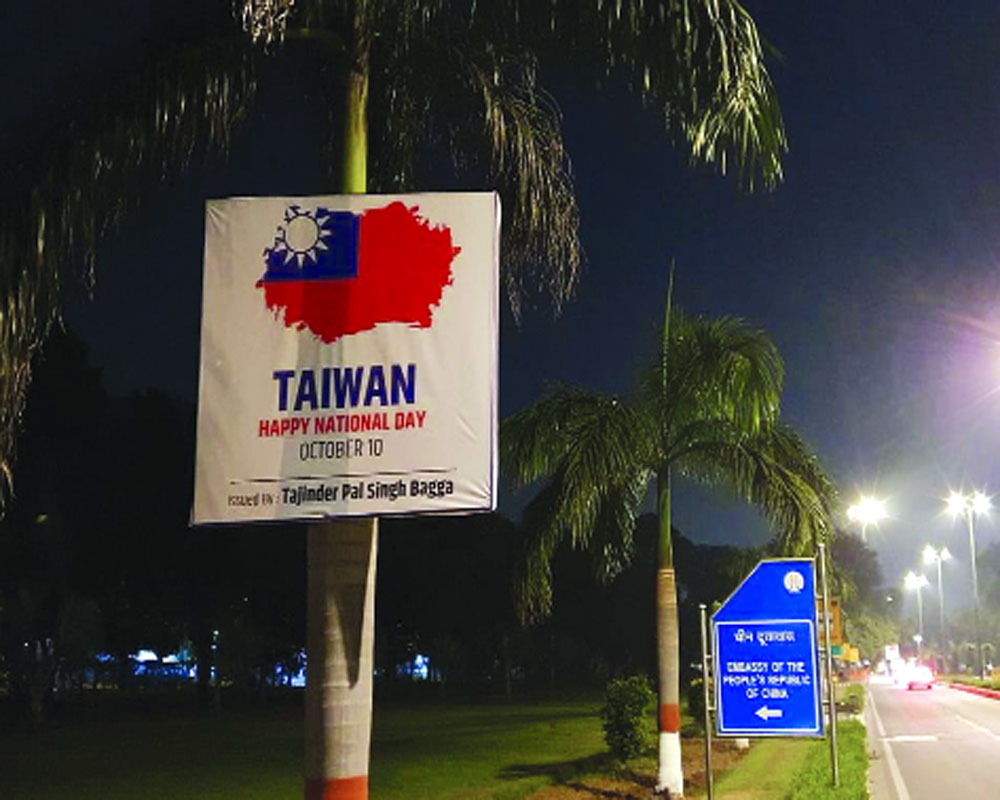India should stay just under the diplomatic threshold and engage more visibly with Taiwan, especially in economic ties, to keep China in check
In any other year, the Taiwanese National Day celebrations in India wouldn’t have assumed such political proportions had both nations not been at the receiving end of China’s maximalist ambitions. So they needed to make a statement about standing by each other in the face of a shared geo-political threat. In a move laden with a message to China, posters of the event were put up outside the Chinese embassy by a ruling BJP member, though they were taken down later on the grounds of not having the required permission. But they had served their purpose. Similarly, Taiwan’s President Tsai Ing-wen thanked “dear friends in India†for sending wishes for the annual celebration, clearly intended to rile up China further after its embassy issued a “letter†to the Indian media to not cover Taiwan’s National Day as it would violate our “One China†policy. Not only that, she even mentioned the Ladakh standoff in her speech among many examples of Chinese expansionist tendencies in the region. What China does not understand is that the Indian media is free to pursue its own policies independent of the official Government line and is not beholden to follow it. The “One China†policy means that the Government doesn’t have diplomatic ties with Taiwan, though both sides have trade offices which operate as de-facto embassies. Beyond the officialese, Taiwan has always been building stronger economic and cultural associations with India. In fact, it is looking at India as a potential business destination as the US trade war with China has pushed its companies to look for newer markets. Besides, to counter China’s colonial takeover of the economic and cultural space in south and southeast Asia with its Belt and Road Initiative, Taiwan has set up its own southbound policy. This focusses on strengthening ties in the areas of culture, tourism, education and trade with 18 southeast and south Asian countries, with India being pitched as one of the pivotal collaborators. The new President is pursuing this aggressively one-on-one with each nation. Trade between India and Taiwan will likely touch $10 billion over the next few years and this has led to synergies across sectors with consistent media coverage of the same. Little wonder then that the Ministry of External Affairs dismissed the Chinese embassy’s instructions, saying the “free†Indian media would report “as it sees fit.†China must realise that the Indian media does not operate by the rules and framework of its own Press, which is an extension counter for its propaganda. And as a free medium in a democracy, it allows debates and discourse on everything, including foreign policy, and allows even dissent. Besides, it has only to measure the coverage and importance that Chinese President Xi Jinping is given whenever he visits India. The Government may have to be vigilant about sensitivities and anxieties but the Indian media is well within its right to criticise China and give space to Taiwan. Even if China insists on “good faithâ€, it must realise that it has long broken that understanding with predatory moves in Ladakh and insisting on reclaiming border positions from 1959. And in a hostile environment, diplomatic niceties cannot be expected. Still India has never subverted the rule of law so far despite Chinese provocations.
Meanwhile, Taiwan, too, has used its National Day to reassert its political and cultural identity and undercut its existence as tied to the mainland. It commemorates a 1911 uprising in the central Chinese city of Wuhan against the nation’s last imperial dynasty. This led to the creation of the Republic of China, which leader Chiang Kai-shek then brought to Taiwan seven decades ago when he fled Beijing as the Communist Party took power. It is just about remembering a historical event but allows Taiwan to technically bypass anything that would suggest total independence. Yet it allows it wiggle room to assert its historical, political and cultural identity subtly. And leverage itself vis-a-vis China, which has been breathing down on it by sending jets in the Taiwanese straits. As far as India is concerned, it can use its proximity to Taiwan more effectively and discomfort China just like it does by using Pakistan against us. The first blow could be economic, by reducing dependence on Chinese goods and moving to high quality Taiwanese products, particularly in the technology and electronic space. The Government has been overtly careful about relations with Taipei for fear of a Chinese hitback. In return for increased Taiwanese investment, it can widen its access to our markets and act as an enabler of Taiwan’s inclusion at all global commercial and strategic bodies and cooperation groups. This way it can have an ally in China’s immediate neighbourhood and use it as an irritant alongside the Quad initiative with the US, Australia and Japan. That China is uneasy about the Indian attempt to encircle it is evident from its mouthpiece Global Times, saying such closeness to Taiwan would “only exasperate the already soured China-India ties.†In fact, India can very well use Taiwan and the Tibet question — by joining the US-led campaign on the latter — to force China into yielding some ground at the negotiating table. Intransigent though it might be, Beijing realises that it cannot risk open hostility with India in a post-pandemic world where opinion is loaded heavily against it. Besides, India can stay just under the diplomatic threshold and niggle China. Instead of being muted, it can be visibly seen to heighten its confabulations with Taiwan and Tibetan representatives, just about enough to pressure China. It is high time we tweak our status quoist positions.


























